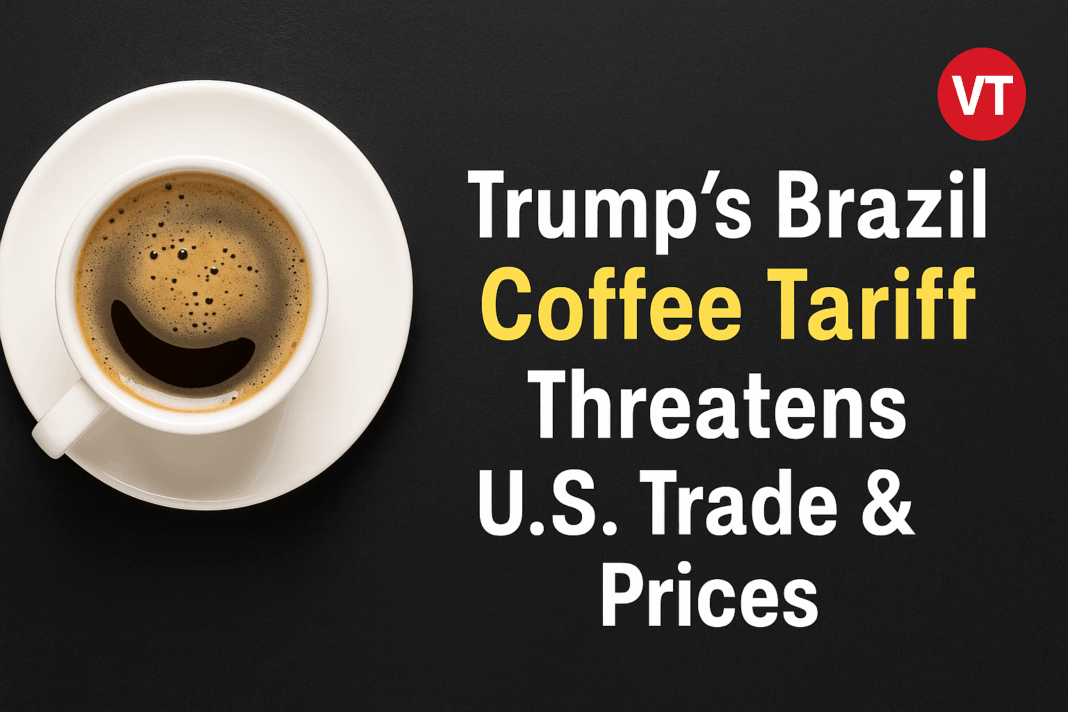- • U.S. President Trump’s proposed 50% tariff on Brazilian imports includes coffee — the U.S.’s most consumed beverage.
- • Brazil supplies 16.7% of global coffee exports to the U.S., now under immediate threat.
- • The move reflects political tensions more than economic rationale, potentially reshaping global coffee trade flows.
Earlier this month, President Donald Trump fired another shot in his global tariff campaign, proposing a 50% tariff on Brazilian imports — including coffee, oranges, beef, and soybeans — unless trade terms improve by August 1 (Coffee Intelligence).
This isn’t just about numbers. Coffee is culture, commodity, and a cornerstone of international relations. And this latest move threatens to fracture decades of economic interdependence — not just between the U.S. and Brazil, but globally.
The Coffee Economy at Risk
Brazil supplies approximately 16.7% of its coffee exports to the United States, which is the largest coffee-consuming nation in the world (Coffee Intelligence). In 2024, U.S. coffee imports from Brazil totaled $2 billion (Reuters). According to the National Coffee Association, every dollar of imported coffee creates $43 in U.S. economic value.
Trump’s move could cause coffee prices to jump by 25 cents per cup, says Michael Nugent, a senior broker at MJ Nugent & Co. A recent Financial Times report noted a 3.5% jump in global coffee prices within 24 hours of the tariff warning.
Brazil exported more than 8.14 million 60-kg bags of green coffee to the U.S. in 2024 (USDA). These beans are essential to American coffee chains and small roasters alike. With prices already inflated due to climate-induced droughts in Brazil and Vietnam, this tariff could create cascading cost pressures across the market (BLS).
The Political Roast Behind the Brew
Let’s not pretend this is about trade fairness alone. The letter sent to Brazil diverged from the standard format Trump used with 24 other nations. It accused the country of “unfair treatment” of former President Jair Bolsonaro — Trump’s political ally — who is currently facing a coup-related trial (Reuters).
Trump’s critics argue that this is retaliation cloaked as economics. While many targets of new tariffs hold a trade surplus over the U.S., Brazil actually provides a $7.4 billion surplus to the U.S., exporting machinery, aircraft, and chemicals far more than it imports (Coffee Intelligence).
Disrupting the Global Blend
Brazil is already pivoting to Asia and Europe. The nation’s main export destination in August 2024 was China (27.4%), followed by the EU (16%) and the U.S. (6.7%) (Coffee Intelligence). Brazilian cooperatives like Expocacer are ramping up certified offerings, expanding logistics services, and targeting traceability-conscious markets to lessen dependence on the U.S.
“If the 50% tariff takes effect, Brazilian coffee will lose key price competitiveness in the U.S. — especially in commercial segments,” says Italo Henrique, Commercial Director at Expocacer (Coffee Intelligence).
Meanwhile, American roasters are bracing. Many are avoiding new deals, hoping tariffs will settle back to 10%. “Some believe these tariffs are here to stay,” said Sean Capistrant of Trabocca. “We think it’s best to plan on them staying in place” (Coffee Intelligence).
The BRICS Factor
Brazil’s shifting alliances add complexity. Under President Lula, Brazil deepened ties with China and BRICS nations. Beijing is now Brazil’s top trading partner and an investor in the logistics that support coffee exports (Coffee Intelligence). The U.S. views these moves warily, especially in the context of Trump’s “America First” trade doctrine.
Ironically, while Trump justifies tariffs on grounds of “unfair trade,” the biggest risk may be to U.S. companies — from Boeing to Starbucks — who depend on a stable Brazilian supply chain. Unlike soy or oil, coffee can’t be swapped overnight. It’s embedded in blends, pricing models, and consumer loyalty.
Final Brew
This tariff isn’t just a tax on imports — it’s a tax on morning routines. On cultural ties. On an industry built on decades of interdependence.
And in the long run, it might leave the U.S. sipping weaker coffee — both literally and economically — while Brazil quietly refills its cup elsewhere.
Follow Virginia Times for regular news updates. Stay informed with the latest headlines, breaking stories, and in-depth reporting from around the world.
A global media for the latest news, entertainment, music fashion, and more.














